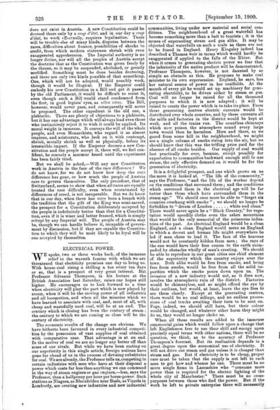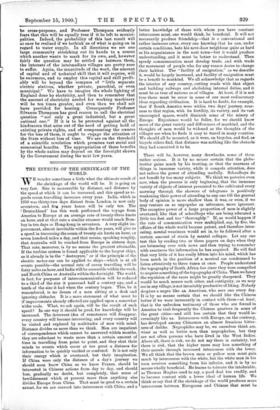ELECTRICAL POWER.
WE spoke, two or three weeks back, of the immense relief to the warmth famine with which we are threatened that electricity promises one day to bring us. With house coal rising a shilling a ton every ten days or so, that is a prospect of very great interest. But Professor Silvanus Thompson, in his lecture at the British Association last Saturday, raises our hopes still higher. He encourages us to look forward to a time when electricity will play the part which is now played by steam, when it will be the moving power of all industries and all locomotion, and when all the miseries which we have learned to associate with coal, and, most of all, with cheap and wastefully used coal, will be at an end. The century which is closing has been the century of steam ; the century to which we are coming so close will be the century of electricity.
The economic results of the change are obvious. We have hitherto been favoured in every industrial competi- tion by the possession of vast supplies of coal obtained with comparative ease. That advantage is at an end. In the matter of coal we are no longer any better off than some of our rivals. But while we have been resting on our superiority in this single article, foreign nations have gone far ahead of us in the process of devising substitutes for coal. We are already, the Professor tells us, competing in certain industries with men who have at their disposal a power which costs far less than anything we can command in the way of steam engines or gas engines,—less, says the Professor, than a halfpenny per hour per horse-power. Such stations as Niagara, as Rheinfelden near Basle, as Vizzola in Lombardy, are creating new industries and new industrial communities, living under new material and social con- ditions. The neighbourhood of a great waterfall has become something more than a bait to tourists ; it is the means of superseding steam and gas alike. It may be objected that waterfalls on such a scale as these are not to be found in England. Henry Kingsley indeed has described a Thames weir in term which would hardly be exaggerated if applied to the falls of the Rhine. But when it comes to generating electric power we fear that the inferiority of the native product will be demonstrated. Professor Thompson, however, is , not daunted by so simple an obstacle as this. He proposes to make coal minister to its own supersession. England, he says, has her natural source of power in her coalfields. At the mouth of every pit he would set up machinery for gene- rating electricity, to be driven either by steam or gas. Coal will no longer be raised for all the thousand purposes to which it is now adapted ; it will be raised to create the power which is to take its place. From these generating centres electric currents would be distributed over whole counties, and by these currents all the mills and factories in the district would be kept at work, and all the trains run. The countless chimneys which now poison the atmosphere round every large town would then be harmless. Here and there, as we gazed from some hill in the neighbourhood, we might see a single column of smoke rising into the air, but we should know that this was the trifling price paid for the absence of all smoke besides. Our supply of coal would last practically for ever, because, except possibly for exportation to communities backward enough still to use steam, the only effective demand on it would be for the generation of electricity.
It is a delightful prospect, and one which grows on us the more it is looked at. " The life of the community," says the Professor, " and the life of the worker depend on the conditions that surround them ; and the conditions which surround them in the electrical age will be far better than those which have surrounded them in the steam age." We should once more be able to "forget six counties overhung with smoke " ; we should no longer be forbidden to " dream of London white and clean." There would never again be a" Black Country," for vege- tation would speedily clothe even the ashen mountains that would be the only memorial of the poisonous indus- tries of the past. An electrical England would be a clean England, and a clean England would mean an England in which a decent and human life might everywhere be led if men chose to lead it. The face of the heavens would not be constantly hidden from men; the rays of the sun would have their free course to the earth unim- peded by obstacles wholly of man's creating. We should be able to reproduce in our great cities one chief element of the superiority which the country enjoys over the town. Both alike would be free from smoke, and being free from smoke, would be free from all the solid im- purities which the smoke pours down upon us. The invasion of a new industry would not, as it does now, involve the atmospheric ruin of the district. Factories would be chimneyless, and so might offend the eye by their outlines, but would, at least, leave the eye free to see them clearly. Except at the generating centres, there would be no coal sidings, and no endless proces- sions of coal trucks awaiting their turn to be sent on. Fogs, indeed, we should still have, but their colour would be changed, and whatever other harm they might do us, they would no longer choke us.
When all these results are added to the immense commercial gains which would follow upon a change that left Englishmen free to use their skill and energy upon precisely equal terms with other nations, there will be no question, we think, as to the accuracy of Professor Thompson's forecast. But its realisation depends in a great degree upon the economical use of electricity. It will not drive out steam and gas unless it is cheaper than steam and gas. But if electricity is to be cheap, proper care must be taken that the supply is not left to each man to get how and whence he can. There must be no more single firms in Lancashire who " consume more power than is required for the electric lighting of the whole city of Manchester." There must be no cross- purposes between those who find the power. But if the work be left to private enterprise there will necessarily
be cross-purposes, and Professor Thompson evidently fears that this will be equally true if it be left to munici- palities. Indeed, the probability of this last result will at once be realised if we bethink us of what is going on in regard to water supply. In all directions we see one large community stretching out its hands to a source which another wants to mark for its own, and, however fairly the question may be settled as between them, the interests of the intermediate villages are pretty sure to suffer. Again, the magnitude of the work, the amount of capital and of technical skill that it will require, will be enormous, and to employ this capital and skill profit- ably will be beyond the compass of "little separate electric stations, whether private, parochial, or even municipal." We have to imagine the whole lighting of England done by electricity, and then to remember that the amount of electricity needed for working machinery will be ten times greater, and even then we shall not have provided for heating. Consequently Professor Silvanus Thompson has good reason to call the electrical question " not only a great industrial, but a great national one." If it is to be protected against all the hindrances that arise out of the need of getting hold of existing private rights, and of compensating the owners for the loss of them, it ought to engage the attention of the State without loss of time. We are on the threshold of a scientific revolution which promises vast social and economical benefits. The appropriation of these benefits by the whole nation may depend on the foresight shown by the Government during the next few years.







































 Previous page
Previous page